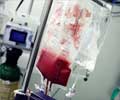Scientists at European School of Oncology have found that blood transfusion from donors with undiagnosed cancers does not expose recipients at higher risk of cancer.
Scientists at European School of Oncology have found that blood transfusion from donors with undiagnosed cancers does not expose recipients at higher risk of developing malignant disease than individuals who receive blood from people without cancer.
Medical professionals always carry out a rigorous battery of tests before the transfusion of blood so as to ensure that no diseases are passed between the donor and recipient. Although the risk of transmission of infectious agents is well established, it has so far been unclear whether blood donation may also result in the transfer of chronic diseases like cancer.Some of the theories suggest that even if a tumour is too small to be detected, it will shed millions of cells into the circulation every day that may have the potential to establish new malignancies within the donor or blood recipient. Furthermore, there exists some data that shows that transfused patients are at increased risk of cancers, particularly non-Hodgkin lymphoma.
With this information on hand, researcher Gustaf Edgren set out to determine whether there was any history of increased cancer diagnoses among individuals that receive blood transfusions from people who donate blood while unaware of their cancers.
Edgren’s colleagues studied registry data regarding blood transfusions in Sweden and Denmark, and created a database from which they identified a group of “exposed” individuals, who had received donated blood from a person who was diagnosed with cancer less than five years after giving blood.
The researchers identified 978 cases of cancer among all the blood recipients. A statistical analysis of those cases showed that individuals who had received one or more blood products from a pre-cancerous blood donor were not at a higher risk of cancer than those who had received blood from average donors.
The relative risk was not substantially affected by sex age, calendar period, or number of transfusions.
Advertisement
The researchers also observed that the cancer incidence among the 9377 recipients of blood from donors with a previous diagnosis of cancer did not differ from that among recipients of blood from non-cancerous donors.
Advertisement
The findings have been published in the journal Lancet.
Source-ANI
SRM/C











